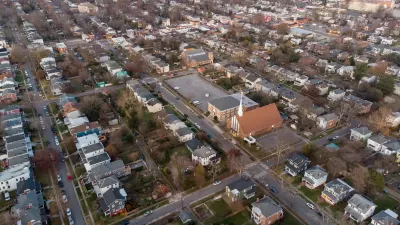After hours of public comment, the zoning reform package aimed at increasing housing production and limiting red tape was delayed for further discussion.

A proposed Constraints Reduction Ordinance in San Francisco stalled in the Land Use and Transportation Committee of the city’s Board of Supervisors, reports Annie Gaus in SF Standard.
“The ordinance is an attempt at implementing the city’s Housing Element, a document laying out how San Francisco plans to meet a state mandate to accommodate 82,000 new housing units by 2030. But a Monday hearing at the board’s Land Use and Transportation Committee highlighted the political difficulties in diminishing local control, along with the potential perils of failing to execute the mandate,” Gaus explains.
Some housing advocates like the San Francisco Tenants Union expressed concerns about the ordinance leading to a loss of rent-controlled units and affordable housing. Gaus notes that “The current ordinance includes demolition controls in certain sensitive areas defined as “priority equity geographies,” according to a Planning Department presentation.” Elsewhere, developers would not be allowed to remove more than two rent-controlled units.
In response to community feedback, “The Mayor’s Office also suggested amendments that include language around the city’s affordable housing needs and conditional use permits for large developments in priority equity zones.” Gaus adds that housing projects in San Francisco face the longest timeline for approvals in California, with projects waiting a median 450 days.
FULL STORY: San Francisco Housing Bill Stalled After Vehement Pushback

Alabama: Trump Terminates Settlements for Black Communities Harmed By Raw Sewage
Trump deemed the landmark civil rights agreement “illegal DEI and environmental justice policy.”

Planetizen Federal Action Tracker
A weekly monitor of how Trump’s orders and actions are impacting planners and planning in America.

How Atlanta Built 7,000 Housing Units in 3 Years
The city’s comprehensive, neighborhood-focused housing strategy focuses on identifying properties and land that can be repurposed for housing and encouraging development in underserved neighborhoods.

In Both Crashes and Crime, Public Transportation is Far Safer than Driving
Contrary to popular assumptions, public transportation has far lower crash and crime rates than automobile travel. For safer communities, improve and encourage transit travel.

Report: Zoning Reforms Should Complement Nashville’s Ambitious Transit Plan
Without reform, restrictive zoning codes will limit the impact of the city’s planned transit expansion and could exclude some of the residents who depend on transit the most.

Judge Orders Release of Frozen IRA, IIJA Funding
The decision is a victory for environmental groups who charged that freezing funds for critical infrastructure and disaster response programs caused “real and irreparable harm” to communities.
Urban Design for Planners 1: Software Tools
This six-course series explores essential urban design concepts using open source software and equips planners with the tools they need to participate fully in the urban design process.
Planning for Universal Design
Learn the tools for implementing Universal Design in planning regulations.
Caltrans
Smith Gee Studio
Institute for Housing and Urban Development Studies (IHS)
City of Grandview
Harvard GSD Executive Education
Toledo-Lucas County Plan Commissions
Salt Lake City
NYU Wagner Graduate School of Public Service





























